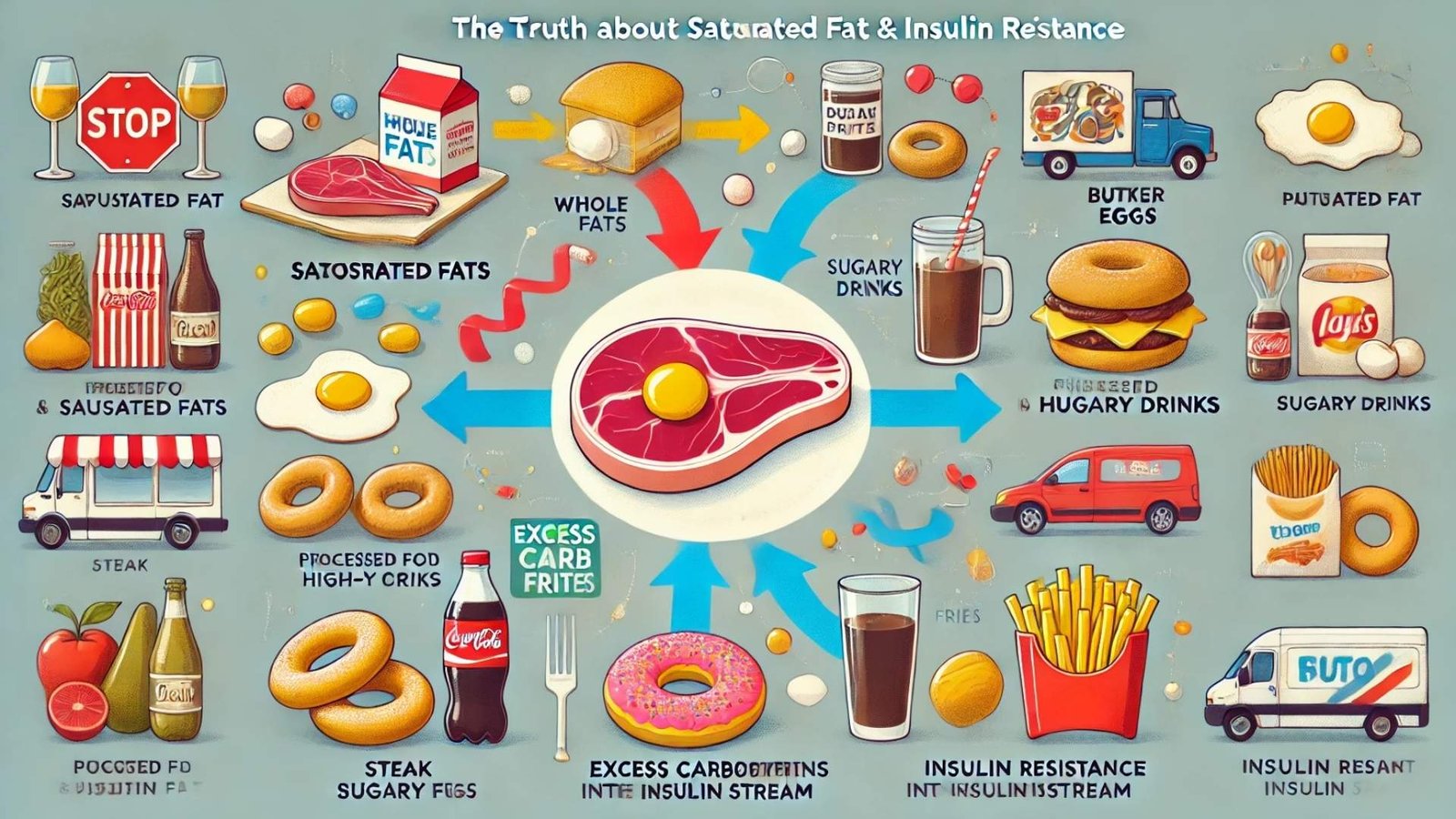For decades, we’ve been told that saturated fat is bad for us—it clogs arteries, causes heart disease, and makes us insulin resistant. The advice has been the same: avoid butter, red meat, full-fat dairy, and anything that isn’t “heart-healthy” (whatever that means).
But hold on a second—what if we’ve been fed the wrong information? What if saturated fat isn’t the villain we’ve made it out to be?
Let’s break it all down and uncover the real story behind saturated fat, insulin resistance, and the shocking truth about what’s actually making us sick.
The Fat Confusion: Why We’ve Been So Scared of Saturated Fat
Saturated fat has been demonized for decades. You’ve probably heard things like:
❌ “Saturated fat raises cholesterol and clogs arteries!”
❌ “It’s the main cause of heart disease and obesity!”
❌ “Avoid butter, eat margarine instead!”
The list goes on.
Much of this fear stems from old, outdated studies and misinterpretations of scientific research. But here’s the kicker—despite reducing saturated fat intake over the last 50 years, metabolic diseases like type 2 diabetes and obesity have skyrocketed. If saturated fat were truly the problem, shouldn’t we all be healthier by now?
So, what’s really going on?
The Science of Saturated Fat and Insulin Resistance
One of the biggest claims against saturated fat is that it causes insulin resistance, which is a key driver of type 2 diabetes. Some early studies did seem to suggest this. But when we take a closer look, the way those studies were conducted raises a major red flag.
💡 Instead of feeding people saturated fat, researchers infused it directly into their bloodstreams or bathed cells in fat in petri dishes.
🚨 That’s NOT how we eat food. 🚨
When we consume fat from whole foods like meat, dairy, and eggs, it goes through an entire digestive process before reaching our blood. Comparing a petri dish experiment to a real-life diet is like saying, “Swimming in water makes you drown, so drinking water must be dangerous!”
That’s not how it works.
Can Eating Saturated Fat Really Increase Fat in the Blood?
Okay, so let’s assume for a second that saturated fat might be guilty. The logic is:
🧈 Eating saturated fat → More saturated fat in the blood → Insulin resistance
But guess what? Science says otherwise.
A 2014 study tracked people increasing their saturated fat intake by two to three times the normal amount. If the old theory was true, their blood should have been loaded with more saturated fat.
But the results? No significant increase in blood saturated fat levels.
👉 So, if eating saturated fat doesn’t flood the blood with fat, what does?
The answer may shock you.
The Hidden Culprit: How Carbs Can Turn Into Fat
If eating more saturated fat doesn’t raise blood fat levels, what does?
🚨 Excess carbohydrates. 🚨
When we eat more carbs than our body can use, the excess sugar gets sent to the liver. And what does the liver do? It turns those extra carbs into saturated fat in a process called de novo lipogenesis.
This means you could be eating zero saturated fat and still have high levels of it in your bloodstream just from excess sugar and refined carbs!
🔬 A 1988 study found that when people ate high-carb meals, their liver flooded their blood with newly made saturated fat.
So if you’ve been blaming butter and steak for high blood fat, it might be time to take a hard look at those processed snacks, sugary drinks, and refined carbs instead.
The Real Danger: The High-Fat, High-Carb Combo
Now, let’s be real—there is one situation where saturated fat can contribute to insulin resistance: when it’s combined with a high-carb diet.
Think about the typical Western diet:
🍟 Fries and burgers
🍩 Donuts
🍕 Pizza
🥤 Sugary drinks + fatty meals
These meals combine high amounts of fat with loads of refined carbs and sugars. This is the worst possible combination because:
1️⃣ The carbs spike insulin, telling the body to store fat.
2️⃣ The fat provides excess energy, making it easier to gain weight.
3️⃣ The constant sugar intake leads to insulin resistance, making it harder for the body to regulate blood sugar.
This isn’t about just fat or just carbs—it’s the toxic combination of both together that’s causing major metabolic damage.
This explains why low-carb, high-fat diets consistently show improvements in insulin sensitivity, weight loss, and metabolic health.
The Takeaway: Should You Eat More Saturated Fat?
So, where does this leave us? Should we be loading up on butter and steak?
Here’s the bottom line:
✅ Saturated fat, on its own, does NOT cause insulin resistance or heart disease.
✅ It’s the high-carb, high-fat combo that creates metabolic chaos.
✅ Your body actually turns excess carbs into saturated fat in the blood!
✅ Studies show that people eating more saturated fat (but fewer carbs) have BETTER metabolic health.
If you’re looking to improve insulin sensitivity, maintain a healthy weight, and support overall metabolic function, focus on whole, nutrient-dense foods and avoid processed junk.
🥩 Enjoy your steak, butter, eggs, and full-fat dairy.
🥑 Pair them with nutrient-rich low-carb foods like avocados, nuts, and leafy greens.
🚫 Ditch the processed sugars, refined starches, and industrial seed oils.
At the end of the day, real food wins—and saturated fat isn’t the enemy we’ve been led to believe.
What do you think? Have you noticed changes in your health after increasing or reducing saturated fat? Let’s discuss in the comments!👇
Final Thoughts
Saturated fat has been unfairly blamed for decades, while the real culprit—refined carbs and sugars—has been largely ignored. The science is clear: when consumed in a low-carb, whole-food diet, saturated fat is not only harmless but actually beneficial.
If you’re tired of the diet myths and ready to reclaim your metabolic health, it’s time to eat smarter, not follow outdated fear-mongering.
Got questions? Drop them below! And if you found this article helpful, don’t forget to share it with someone still scared of butter! 🧈😊

